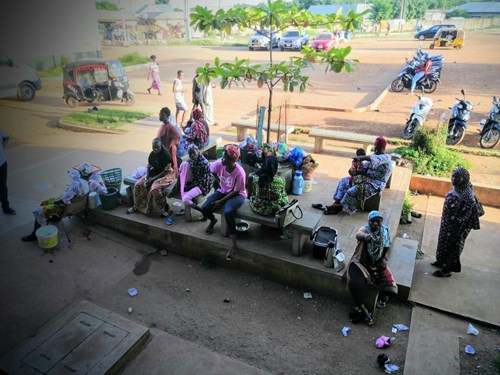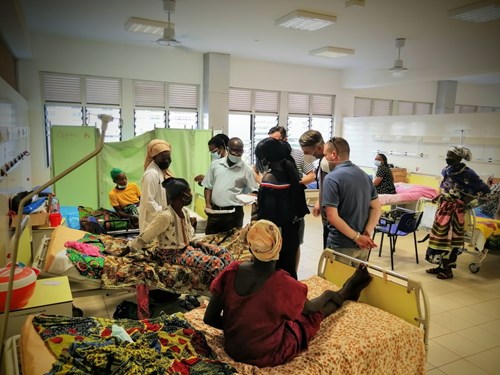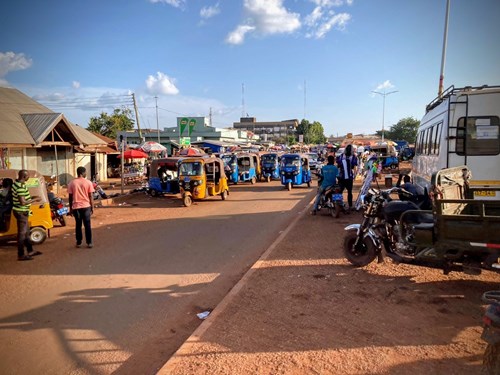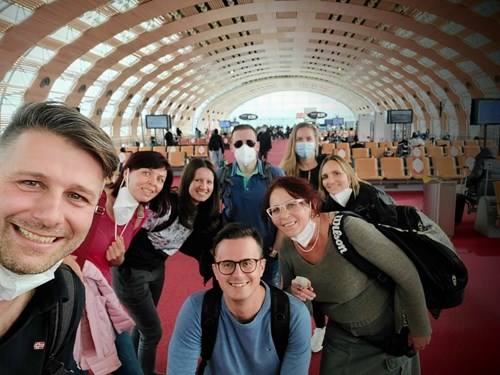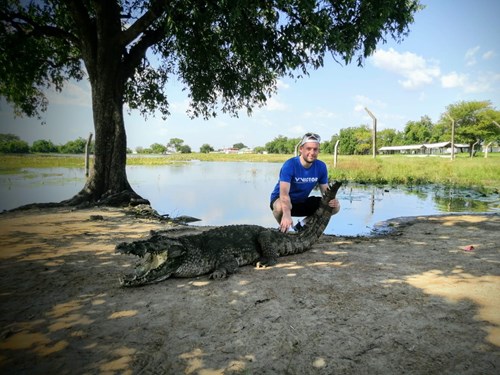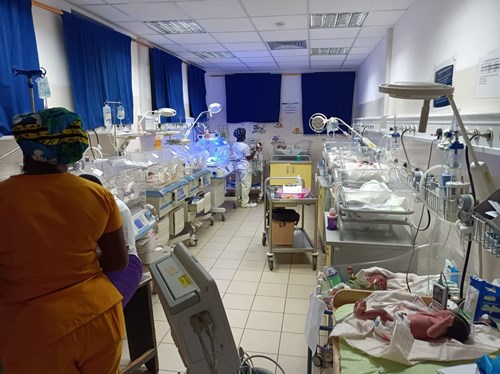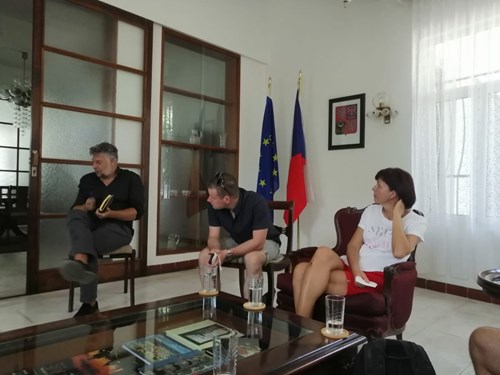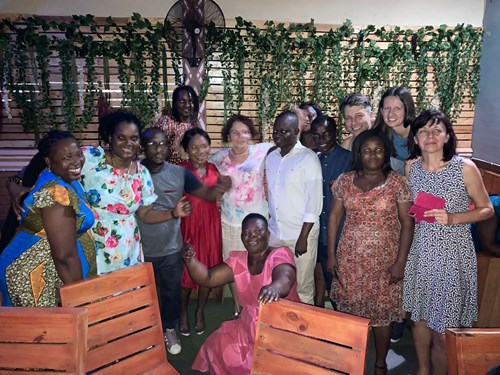
Department of Gynaecology and Obstetrics Team on Humanitarian Mission in Ghana
Medical care in the Czech Republic is at a very high level and our medical professionals are among the best in the world. We at the Department of Gynaecology and Obstetrics UH Brno and FM MU are happy to pass on our knowledge and experience where it can help individuals and improve the quality of life in the long term. That is why we have joined the MEDAVAC programme of the Ministry of the Interior.

The MEDEVAC programme focuses specifically on providing medical care in regions of the world in need. Its principle is to help improve conditions in developing areas in place, thereby reducing the need for migration of local populations. The medical teams' trips are usually short-term, but the programme tends to be busy. Our doctor Petra Vinklerová describes how the programme works on her blog: “There is a lot of interest, some women travel with their whole family from far away. Having relatives to look after them after the operation is one of the most important conditions for the procedure to be performed at all. It is common for the family to take care of the patient in the hospital, bringing food, providing hygiene and rehabilitation. The ward is thus always full of people, as there are several other caregivers per bed. Outside the hospital building, it looks like a housing estate - preparing food, doing laundry, resting. When we leave the hospital at nightfall, the premises turn into a small marketplace, with supplies of liquids and food being replenished."
The collaboration with Tamale Teaching Hospital, which our team chose based on recommendations from MEDEVAC colleagues, began this spring. We welcomed local physician Dr. Ana María Simono Charadan, MSc. During her visit to us, she had the opportunity to learn about the operation of our clinic, participate in oncogynecological surgeries, and also visited the Simulation Centre and the Anatomical Museum of the Faculty of Medicine MU. Subsequently, this summer the Head of the Gynaecology and Obstetrics Department, Assoc. Prof. Vít Weinberger, M.D., Ph.D., visited the hospital in Ghana to see the situation, so that the whole medical team could go there this autumn.
From 12th to 24th October, a team of six health professionals from our department was on-site, including the Head of the department, Assoc. Prof. MUDr. Vít Weinberger, Ph. D., MUDr. Michal Felsinger, MUDr. Petra Vinklerová, MUDr. Libor Viktora, MUDr. Dagmar Seidlová, Ph. D. and chief instrument technician Bc. Martina Rosáková. The aim of our team was to provide surgical treatment to as many patients as possible who could not afford it under normal circumstances and at the same time their condition is so serious that it limits them in everyday life, making it difficult for them to work and thus to earn money and provide for their families. Doctor Vinklerová describes how their surgery days went on in her blog as follows:
"We arrive in the operating room at eight o'clock in the morning. There's a lot of local staff running around, but it's absolutely impossible to tell who's who and no one is actually doing anything in particular, so we end up starting quite late. We're split into two surgical teams. However, we only have one instrument technician and one anaesthetist each, so there's always a bit of improvisation in the other room. I operate with Vítek, who, as the most experienced surgeon, starts with the most complicated cases. These are two patients with a suspected vesicovaginal fistula (an artificial opening between the bladder and vagina through which urine constantly drains). In our country, this diagnosis is very rare, but in Africa it is quite common, most often occurring as a complication after a caesarean section or long labour. We open the abdominal wall and gradually try to clear the operation field. Wow, it's like an explosion in here. All the organs, they're stuck together, they need to be separated. After a while, we get it right, but we can't find the uterus. That's impossible. Where is it? Um, it's just not here. "The patient must have forgotten to tell us," shrugs Ana Maria, the head doctor. Oh, my God, how were you examining her that you didn't figure it out? I guess it happens, well, nobody's perfect... After a moment of exasperation at the lack of pre-operative preparation, we at least find the defect that was really causing the patient trouble and manage to fix it."
"It's Monday morning and we're arriving at the hospital. There was a huge storm outside overnight, still a bit of a drizzle, and in such cases, the locals don't really want to work. The operating theatres are half empty and one is completely dark. The power's out, but they say they're working on it. Today we're switching teams, Vítek and Libor are starting with a heroic performance. A childless patient with a myomatous uterus extending above the umbilicus (myom = benign tumour developed from the muscles of uterus). Wow, that's pretty cool! None of us has ever seen that before. It's a common diagnosis here, but black women are more predisposed to it. For women of reproductive age, it's our most common surgery here. We promised to try to save the uterus so she could have children. It's a challenge for the boys, but they're fighting it pretty well. At the end of the surgery, we count 61 myoms! Three and a half kilos in total. That's really unbelievable, but it's hard to say if any pregnancies will even happen after that kind of intervention. Vítek jokes that if it does, he has to come to the christening."
In total, our team in Ghana managed 42 challenging gynaecological operations. As a parting gift, their colleagues from Tamale prepared a surprise - they had their surgical outfits tailored with their names embroidered on them.
As our doctor Petra Vinklerová summarizes in her latest blog post:
"The biggest heroes of the mission are anaesthesiologist Dagmar Seidlová and instrument technician Martina Rosáková. Dáša has to deal with all the complications with only the most basic equipment. Every day she experiences unpleasant moments when she finds out what else is unavailable in here. Martina, on the other hand, managed to perfectly estimate a sufficient number of tools and materials to have something to work with. The local instrument technicians are enthusiastic to learn from her and almost argue over who gets to go to the surgery to wash and hand the instruments."
The medics were subsequently invited by the ambassador to visit the capital Accra and were also interviewed by a local newspaper there. As a further continuation of this humanitarian cooperation, a trip of selected health workers from the Tamale hospital is planned to visit our clinic.
If you are interested in learning more about this mission and the medical cases our team encountered, continue reading on the blog of our doctor Petra Vinklerová.
